- Home
- Allan Topol
Enemy of My Enemy Page 8
Enemy of My Enemy Read online
Page 8
Chapter 8
General Kemal, the director of Turkish military intelligence, stood at the window of the building that housed the prime minister's office, and wiped the perspiration from his forehead. Kemal gazed at the park below, and at central Ankara filled with nondescript cinder-block buildings. It always amazed him that a nation as rich in history and culture as Turkey could have such a boring capital. But perhaps it was fitting for a country that in the last few centuries had been forced from its rightful place in the top tier of the world by the Christian nations of Europe and was being maintained there by the upstart, arrogant Americans.
That thought grated on Kemal so badly that he had decided to take a giant step to assert Turkey's independence from foreign dominance, a bold move to shape its own destiny.
For it was Kemal who had given Colonel Abdullah the order—in a clandestine meeting at night on a deserted hilltop—to shoot down an American plane. It was Kemal's plan. And no one other than he, Abdullah, and a handful of troops loyal to Abdullah knew about it. No one else had to know.
The course of events from that point forward should have been simple. Kemal would claim that the Kurds had shot down the plane, which would create a rift between the Americans and their new friends—the despicable Kurds. Abdullah would interrogate the pilot about American military plans, then kill and bury him where he would never be found.
It was all so straightforward. Then Kemal had learned from an agent attached to the Turkish Embassy in Washington that the pilot was the son of a powerful American named Terry McCallister with close ties to President Kendall. That had led Kemal to instruct Abdullah to take good care of the pilot. He might be a valuable bargaining chip, although Kemal didn't know how he could be used.
Now the Turkish politicians were in the act. As usual they were anxious to suck up to the Americans. It was disgusting. The call summoning him to this meeting had come from the defense minister. One terse sentence: "You have some serious explaining to do."
Everything was in danger of unraveling, but Kemal refused to bend. He refused to be sacrificed at the alter of Turkish-American relations. He wiped the moisture from the back of his neck, then put the handkerchief away and looked at his watch. The defense minister had asked him to come at two this afternoon. It was already 3:25. It was as if they thought his time was of no consequence. That infuriated him further.
Finally the thick wooden door opened and the defense minister came out of the cabinet meeting. "We're ready for you now."
Kemal followed him inside, passing the two guards armed with AK-47s who stood at the entrance of the inner sanctum.
At one end of the long wooden table sat the prime minister. He was a short, squat man who was overweight. Thick black-framed glasses were pushed up on his high forehead, exposing tired, bloodshot eyes. The six other top cabinet officers were spread out, three on each side of the table.
The prime minister pointed to the chair facing him at the other end and nodded toward Kemal, who realized that this was his cue to sit down.
He was confronted with a hard, cold stare. "You told us that the Kurds fired the missile that brought down the American plane." The prime minister's words were spoken with a cold, white anger.
Keep calm, Kemal cautioned himself, while he clutched the sides of his chair for support. "That's what I have been advised by our troops in the area, and I have pressed them hard."
The prime minister snarled. "Obviously not hard enough. The Americans have now supplied us with proof, by satellite photos and other evidence, that our forces are responsible."
Kemal considered asking to see the evidence, but he quickly banished that thought. The Americans were good at this kind of technology. Focusing on what they had would only dig him deeper into a hole. Instead he straightened up and looked indignant.
"The Americans have no right to call us liars. Why would we shoot down their plane?"
"You're the head of military intelligence. You tell me."
The defense minister tried to help Kemal out. "Perhaps one of our men made an error. He mistook it for an enemy aircraft. Not our ally's."
"That's certainly possible," Kemal said quietly. "I'll fly to the area immediately. I'll personally conduct an investigation."
Kemal rose, hoping he could leave.
"Not so fast," the prime minister said. "The situation is even worse than that. The American pilot's father is Terry McCallister."
Kemal feigned bewilderment. "The name means nothing to me."
"He's one of President Kendall's top supporters."
Kemal swallowed hard.
"As you might imagine," the prime minister continued, "the Americans are threatening very serious repercussions if their pilot is not returned within ten days. They say that they'll cut off all aid and attack one of our air force bases."
Kemal remained standing. "Let the Americans try it," he replied softly. "We're not the Iraqis. We have powerful antiaircraft batteries in place at all our bases."
The prime minister shook his head in disbelief. "Is this what you want? A war with the Americans?"
"We don't have the pilot," Kemal said, shifting his ground. "How can we return him?"
The defense minister interjected: "They have evidence that he parachuted out over our territory. He couldn't have disappeared."
"It's hilly, wild terrain with lots of caves. He could be hiding in one." Kemal shrugged. "He could have been injured when he landed. The plane hit rocks and broke into millions of pieces. I had our troops check the area of the wreckage. They didn't see any sign of the pilot."
"The Americans want to inspect the wreckage of the plane themselves."
Kemal was looking at the defense minister, playing toward him as the most hopeful audience. "It's our land. We'll report to them. They have to respect our territorial integrity. I'll look at the plane. If any portions are salvageable, we'll return those to the Americans. They're always trying to dictate to us."
The defense minister was sympathetic. "Let General Kemal visit the area himself and report back. Then we can decide on our next steps."
The prime minister was watching Kemal closely, gazing at him suspiciously. "There's more to this than meets the eye."
Kemal straightened up and looked indignant. "I resent the insinuation." Even as he protested his innocence, Kemal felt moisture spreading under his arms.
"Then disprove it," the prime minister said. "Find the pilot and bring him here so I can deliver him to the American Embassy."
Now in the back of a car on the way to a military airport, General Kemal closed his eyes and focused hard on the jam he was in. There had to be a way out. As they were reaching the air force base for his flight to southeastern Turkey, he had a possible answer. He yanked the phone out of his pocket and dialed the cell of Maj. Gen. Husni Nadim, the deputy director of Syrian intelligence. Since the United States had attacked Iraq, Kemal and Nadim had increasingly coordinated intelligence activities.
"Where are you now?" Kemal asked.
"In Damascus."
"Can you meet me in Van tonight? It's quite important."
"I'll be there."
"Check into the Buyuk Urartu and wait in your room. I'll call you."
* * *
The Syrian, Major General Nadim, was trembling with excitement as he waited in his hotel room for Kemal to call. He didn't know precisely what Kemal wanted, but his guess was that it concerned the American pilot who had been shot down over southeastern Turkey.
Though it was almost midnight, Nadim was dressed in a perfectly pressed military uniform. He was tall and suave, with a thin mustache he thought gave him a debonair look that appealed to Parisian women. When he wasn't in Damascus he was in Paris. Nadim despised the Syrian capital, which he viewed as a cultural cesspool lacking in the pleasures of life. But then again, how many other places in the world could rival Paris in that regard?
Nadim had fallen in love with the city of lights when he had been a student at the Sorbonne. His good looks
concealed a keen intellect. They also concealed a hard, cruel streak that enabled him not only to survive amid a multitude of intrigues, but to plan many of the recurring bloodbaths aimed at purging their foes. When Syria had tightened its control over Lebanon years ago, it was Nadim who eagerly assumed the role of strongman and implemented a program of systematically executing any Lebanese leader or private citizen, Christian or Muslim, inclined to oppose Syrian control or to make peace with Israel. The flow of Lebanese blood, for which he was responsible, earned Nadim the nickname "the Butcher of Beirut."
Nadim, who hated the Americans because of their support for Israel, had cheered when he had heard an American plane had been shot down, though he had no idea who was responsible. What surprised him was that the Americans hadn't released the name of the pilot the way they usually did. So he activated some very good sources in Washington. To his pleasant surprise, he found out that the pilot's father was one of President Kendall's big supporters. Nadim, who had spent three years attached to the Syrian Embassy in Washington, knew how the Americans worked. This incident had to be getting a lot of top-level attention at the White House.
The phone rang. It was Kemal. "I'm in front of the hotel in a black car. Come now."
Nadim moved swiftly from the hotel entrance to the car. He wasn't surprised that Kemal was in the back of a bulletproof vehicle. Van was a focal point for the Kurdish separatist movement, and violence was a daily occurrence. Nadim got into the back with Kemal. Up front next to the driver a soldier clutched a machine gun tightly, his eyes darting in all directions.
They drove for about fifteen minutes until they reached a hospital surrounded by armed soldiers.
Kemal climbed out. With Nadim at his side, he led the way to a staircase, then two floors underground. The armed guard from the car was following right behind.
Midway along a deserted corridor they reached an empty room with a table and two chairs, used to interrogate prisoners who happen to be patients. Kemal told the guard to wait outside. Once he and Nadim were alone, he kicked the door shut.
This was an odd place for their discussion, Nadim thought, but he decided not to say anything. It was Kemal's show. The two of them had increasingly cooperated since the Americans had brought down Saddam Hussein's regime. Kemal and Nadim had developed a mutual respect.
"Thank you for coming on short notice," Kemal said when they were both seated.
"You told me it was important. That was enough. I assume it concerns the American pilot."
Kemal nodded. "It was my idea to shoot down one of their planes and say the Kurds did it."
Nadim raised his eyebrows. "Very creative."
"But now it's all turning to shit."
"Because of the identity of the pilot."
"How do you know?"
"I have my own sources in Washington. What are the Americans telling your government?"
"They know we did it, and they're all worked up because it's Terry McCallister's son. Initially I thought it was good that the pilot had an important father. Maybe he'd be valuable to swap for something."
Kemal paused and shook his head in disgust. "Now I realize I got a bad break. If it had been some ordinary kid, they wouldn't be going berserk in Washington... and turning my prime minister into a wild man." He took a deep breath and repeated. "A bad break. I need your help, my friend."
Nadim's mind was racing. An idea was taking shape—something that was at once brilliant, daring, and sinister. Something that could radically change the course of events in the Middle East and propel Nadim to control of the government in Syria.
"Perhaps it's not a bad break at all," Nadim said softly. "Perhaps you got lucky."
"I don't understand."
"Where is the pilot now?"
Kemal raised his hand and pointed a finger to the right. "We're holding him in a room at the end of the corridor... sedated and unconscious. He has no idea where he is or how he got there. He's being carefully watched and monitored by a doctor and a nurse. But I can't keep him here much longer. I'm under tremendous pressure from my government to find him and return him to the Americans. That's why I called you. I was hoping you'd be able to take him secretly to Syria. That way I could say he's not in Turkey. Even if the Americans came here with a whole army, they wouldn't find him. You could kill him and dispose of the body however you'd like. I can't do that any longer because they'll interrogate people, and some frightened bastard will talk. But they'll never think to focus their attention on Syria. If you do this for me, I will be in your debt."
Nadim couldn't believe he was hearing this. It fit perfectly into his own idea.
"Well... will you do it?" Kemal asked nervously.
"I'll do more than that," Nadim said, letting the excitement bubble out in his voice. "I have an idea that will make you a hero for all time in your country, because Turkey will finally be able to control the Kurds. They'll bow down to you in Ankara—the prime minister and all of the other top people in the government."
"I'm listening," Kemal said, still apprehensive.
Though he was acting on his own, Nadim was ready to forge ahead. Ahmed, that imbecile of a president Syria had, would never understand the plan even if Nadim explained it to him a hundred times. The Syrian president was an optometrist by education. When he had been handpicked by his father as a successor to punish his power-hungry uncle for plotting to capture the presidency, the streets had erupted with laughter. The man was no leader.
But when Nadim succeeded, he would be able to rally the army behind him and oust Ahmed. He would know how to run the country. They would finally be able to strike back at the Israelis for the 1967 and 1973 humiliations.
"The first thing we have to do," Nadim said, "is move the American pilot to Syria, but not for execution, as you suggested. Instead, for safekeeping. I have the perfect place to hold him."
Kemal was troubled. "But if he's alive he can create problems for us. If my prime minister finds out—"
Nadim held up his hand. "Hear me out first. Then you decide."
"Okay. Tell me your idea."
Nadim began talking, and as he listened to the Syrian for the next half hour, Kemal, too, became excited by what he was hearing. A smile formed at the edges of his mouth.
"If we can pull this off," Kemal said, "both our countries will be so much stronger and more dangerous. You'll be better able to deal with the Israelis, and we with the Kurds."
"Exactly." Nadim nodded vigorously. "It will change the entire political situation in the Middle East. And we will succeed." Nadim said it with confidence.
Kemal became nervous again as he thought about one of the aspects of Nadim's plan. "But we need the miserable Iranians to participate. They're unpredictable. And they hate us because of our secular government. They'll never go along."
Anxious to gain Kemal's unqualified support, Nadim placed a reassuring hand on the Turk's arm. "They despise the Israelis even more. They won't pass up an opportunity to weaken the Israelis and their position as the dominant military force in the region. Besides, they'll be able to gain some concessions from the Americans."
Kemal was mired in thought, weighing the risks and benefits to himself. Deep furrows appeared on his forehead.
Nadim pressed the Turk. "When we succeed, you'll be a hero in your country."
"And if we fail..."
"We won't fail," Nadim said. "You can count on that."
Kemal was coming around. Whether or not Nadim's plan succeeded in the long run, Kemal would gain an immediate advantage: He was getting the American pilot out of Turkey and across the border into Syria. "I'm in," Kemal finally said.
When Kemal left the room to make the arrangements to transport the American pilot, Nadim pulled the phone from his pocket and dialed a Paris number. There was no answer. He decided to leave a message.
"Layla, my dear," Nadim said, "I'll be back in Paris in a couple of days. I want to schedule a date with you for dinner."
Chapter 9
Michael Hanley waited for Irina in a blinding snowstorm in Moscow in front of the Pushkin Memorial Museum on Prechistenka. Night was falling over the city. Two hours ago Irina had called. "Dmitri's going out of town on a business trip." She had giggled. "We can have a date tonight."
This could be the break he had been waiting for with Suslov. He wanted to shout, "Where has he gone?" but he controlled himself. If things broke his way, he'd end up getting that information.
He glanced at his watch as large, wet snowflakes pelted him. She should have been here fifteen minutes ago.
A new dark silver Mercedes SL500 turned the corner and spun to a stop. Through the windshield he spotted Irina—beautiful Irina with skin as white as the falling snow and long blond hair spilling over her eyes. The car must have been a gift from Suslov, Michael decided. God only knew how much it cost in rubles, with expensive foreign imports priced to the sky. But if you were virtually minting money, as Suslov was doing, price was no object. Hell, maybe he had his goons extract it from a car dealer as a "protection fee" if they wished to stay in business.
Michael was still closing the front door on the passenger side when she gunned the engine. The car glided over a patch of icy snow, then shot forward. For the next several minutes Irina, nervously glancing into the rearview mirror while biting down on her lower lip, didn't say a word. Michael watched her. Her short black skirt had ridden up high on her thighs, showing him lots of beautiful soft, pale skin. While her right foot was pressed tensely on the accelerator, her left leg, encased in a long black Ferragamo boot, was shaking from fear.
Once she was satisfied they weren't being followed, she relaxed.
"I'm glad you could meet me, Micki," she said in Russian, which was what they always spoke. She had studied English in school, but retained little of it.
"I'd meet you anytime," he said.
Irina loved calling him Micki because she said Michel and Michael were too formal. Though he hated that nickname because it reminded him of his childhood in a rough part of ethnically divided Boston, where it was still the Dagos against the Micks, he was willing to tolerate it. There was a lot he was willing to tolerate with Irina. He was going for the gold.

 Conspiracy
Conspiracy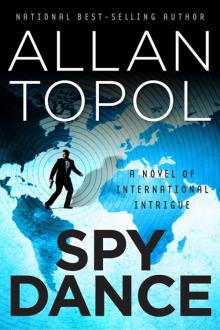 Spy Dance
Spy Dance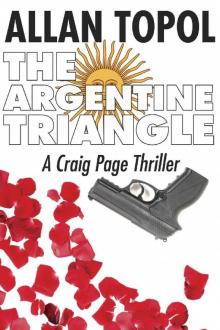 The Argentine Triangle: A Craig Page Thriller
The Argentine Triangle: A Craig Page Thriller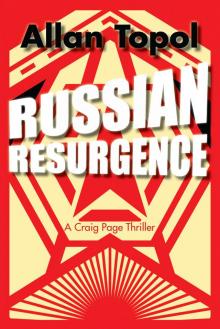 Russian Resurgence
Russian Resurgence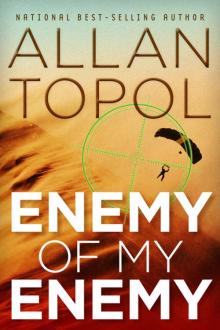 Enemy of My Enemy
Enemy of My Enemy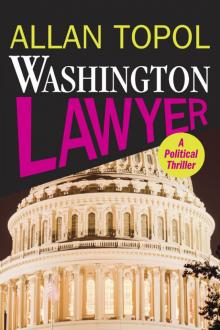 The Washington Lawyer
The Washington Lawyer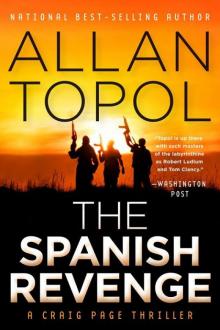 THE SPANISH REVENGE (Craig Page series)
THE SPANISH REVENGE (Craig Page series)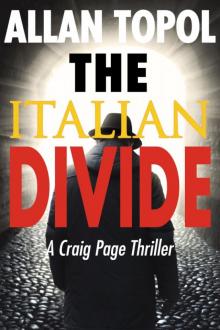 The Italian Divide
The Italian Divide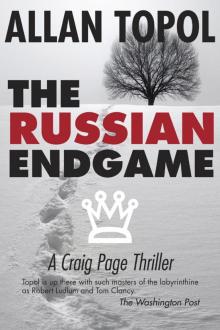 The Russian Endgame
The Russian Endgame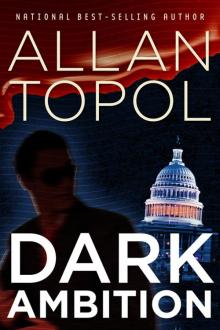 Dark Ambition
Dark Ambition